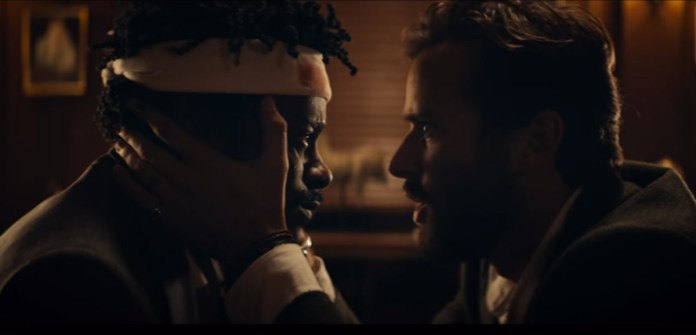Very rarely is a director’s debut feature as ambitious, distinctive and politically engaged as Boots Riley’s Sorry to Bother You. Best known for his rapping, Riley bursts onto the film scene with complete self-assurance in his idiosyncratic brand of humour. Thrillingly fresh, provocative and jam-packed with offbeat jokes, Sorry to Bother You has future cult classic written all over it.
Sorry to Bother You starts off fairly ordinarily, introducing us to jobless Cassius (Lakeith Stanfield) who resides in his uncle’s garage with equally skint girlfriend and performance artist Detroit (Tessa Thompson). Four months behind on his rent and desperate for money, Cassius decides to take up employment at telemarketing firm RegalView. Initially, he struggles to keep anyone on the line during his cold calling script, but once he employs a ‘white voice’ (provided amusingly by David Cross) the sales start to roll in. It’s not long before his success is noticed by management and he’s promoted upstairs to become a ‘power caller’. While Cassius is earning the big bucks, his former colleagues, led by Squeeze (Steven Yeun), have unionised and are protesting to demand fairer pay. Cassius soon finds himself caught between his loyalties with former co-workers and the luxuries that pursuing his new career will provide. It’s here, as Cassius gets drawn into the dodgy business affairs of RegalView and learns of their worrying connection to the exploitative ‘WorryFree’ corporation, that things descend into deeply bizarre territory.
Set in a warped, present-day version of Oakland, where the WorryFree corporation guarantee free food, accommodation and healthcare in exchange for your signature on lifetime employment contracts. Essentially forcing the most vulnerable people of society into slave labour, WorryFree is a potent symbol of capitalist exploitation and dehumanisation. Riley takes aim at an array of other issues with his imaginative satire including racial/social inequality, the appropriation of black culture and social media’s dangerous relationship with commodification. The targets are vast and sometimes a little too broad, but Riley always manages to dress up his hard-hitting themes with delightfully wacky humour and a madcap energy.
The range of comedy that Riley manages to cram into Sorry to Bother You is mightily impressive. There are big, stylish jokes – like Riley and his desk quite literally dropping into the houses of whoever he’s cold calling. And subtle but equally hilarious recurring visual gags – like Detroit’s diverse range of impractically large earrings. The film swings from scathingly satirical to absurdly silly and there’s plenty of cultural references thrown in too; a zany corporate video directed by an alternative version of Michel Gondry being a particular highlight. It consistently defies categorisation, taking wild left field turns just once you think you’ve got it figured out. The third-act takes a completely wild tonal shift which is likely to be too much for some, still you cannot help but be in awe of Riley’s inventiveness.
In the lead role, Stanfield navigates the craziness of the plot with aplomb and exudes a pathos that keeps us on side with Cassius even when he turns his back on his friends. Thompson also puts in a fantastic, lively turn and Yeun is sympathetic as lead protester Squeeze. However, the film’s most eye-catching performance comes from Armie Hammer as author, businessman and morally bankrupt CEO of WorryFree. His wonderfully unhinged performance gleefully plays against type and his drug-fuelled, shamelessly nefarious actions deliver some of the film’s biggest laughs.
Sorry to Bother You is a ridiculously bonkers ride and while it may juggle too many ideas at times its ambition is to be applauded. With this film, Boots Riley has introduced himself as a wickedly funny director with plenty of important things to say on our current cultural climate.









